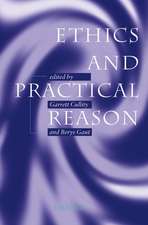Seductions of Fate: Tragic Subjectivity, Ethics, Politics
Autor G. Basterraen Limba Engleză Hardback – 24 feb 2004
| Toate formatele și edițiile | Preț | Express |
|---|---|---|
| Paperback (1) | 382.95 lei 43-57 zile | |
| Palgrave Macmillan UK – 2004 | 382.95 lei 43-57 zile | |
| Hardback (1) | 387.75 lei 43-57 zile | |
| Palgrave Macmillan UK – 24 feb 2004 | 387.75 lei 43-57 zile |
Preț: 387.75 lei
Nou
Puncte Express: 582
Preț estimativ în valută:
74.19€ • 77.67$ • 61.39£
74.19€ • 77.67$ • 61.39£
Carte tipărită la comandă
Livrare economică 07-21 aprilie
Preluare comenzi: 021 569.72.76
Specificații
ISBN-13: 9781403921710
ISBN-10: 1403921717
Pagini: 256
Ilustrații: X, 215 p.
Dimensiuni: 140 x 216 x 18 mm
Greutate: 0.41 kg
Ediția:2004
Editura: Palgrave Macmillan UK
Colecția Palgrave Macmillan
Locul publicării:London, United Kingdom
ISBN-10: 1403921717
Pagini: 256
Ilustrații: X, 215 p.
Dimensiuni: 140 x 216 x 18 mm
Greutate: 0.41 kg
Ediția:2004
Editura: Palgrave Macmillan UK
Colecția Palgrave Macmillan
Locul publicării:London, United Kingdom
Cuprins
Acknowledgements INTRODUCTION: SELF-DENYING CREATIVITY Necessary fate The allure of tragic guilt Tragic modern subjectivity The fiction of fate Tragic autonomy meets ethical heteronomy PART I: NECESSARY FATE A fractured source of authority Agent and victim at once: Creon Cooperating with death: Agamemnon, Etocles Destiny's other side PART II: THE ALLURE OF TRAGIC GUILT Objective necessity as the desire of the Other: Phaedra with Lacan Death as evasion Exceeding sublime tragic sense: Oedipus, Antigone Failures of the imagination: Aristotle's plot and Kant's antinomies Tragedy's refusal of meditation PART III: TRAGIC MODERN SUBJECTIVITY Hegel and the Double Blinds of Consciousness Self-Created Victims: Freud, Althusser, Foucault Staying on This Side of power or the subject's participation Subjection for the sake of autonomy Agency premised on constraint Beyond sublimation or worse than tragic Subjectivity as necessary fiction PART IV: THE FICTION OF FATE Creating destiny: Lorca's Blood Wedding Exiting death From self-victimization to responsibility Awareness of fictionality PART V: TRAGIC AUTONOMY MEETS ETHICAL HETERONOMY The enigma of Kant's ethics Lévinas and the ethical demand A freedom ineluctably invoked Authoring the Other's decision The limited perspective of autonomy Tragic heteronomy and ethical heteronomy A politics beyond commitment Notes Works Cited Index
Recenzii
'Basterra's thesis - that tragedy structures modern subjectivity - is amply and originally demonstrated here. The range of texts she brings to the fore is unprecedented in its cultural breadth and illuminating force. Written with erudition in both philosophy and literature, this book is impressive, moving, serious, passionate and important.' - Judith Butler, Department of Rhetoric and Department of Comparative Literature, University of California, USA
'In an exploration of an exceptional intellectual rigour and intertextual complexity Gabriela Basterra draws, in this book, a most insightful and fascinating picture of the tragic destiny of modern subjectivity. There can be little doubt that Seductions of Fate will be seen as one of the great theoretical interventions of the last ten years.' - Ernesto Laclau, Department of Government, University of Essex, UK
'The quality, scope and originality of this book sets an important (indeed, rare) example for future research.'- Francisco-J. Hernandez Adrian, Department of Romance Studies, Duke University, USA
'Basterra's is a rare and important new voice on the international scene, and this work, as no other with which I am personally familiar, points the way beyond the post-modernist orthodoxies that preoccupy and hobble so much contemporary thought. Her work engages real possibilities for thinking about political and ethical subjectivity.' - James Creech, Director of Graduate Studies, Department of French and Italian, Miami University, USA
'How does one read texts that are infused with a prestige and an authority that render them, it would seem, critically unassailable? This question may serve as a reminder that myth-making is not the exclusive province of mythology and tragedy as they have been variously appropriated by Europeans since the Renaissance. How does one argue that tragedy and the tragic, in texts spanning the length of so-called Western history, conceal a structure that mightalso suggest the way out of the necessity of subjectivity? In other words, what are the ethics, and the politics of tragic subjectivity? In this remarkable new book by Gabriela Basterra, these questions are addressed soberly and critically through breath-taking readings and arguments on a vertigo-inspiring constellation of classical and modern; philosophical, literary, and theoretical texts. The result is an original theory of subjectivity where ethics and politics have taken central stage.' - Revista de Estudios Hispánicos
'In an exploration of an exceptional intellectual rigour and intertextual complexity Gabriela Basterra draws, in this book, a most insightful and fascinating picture of the tragic destiny of modern subjectivity. There can be little doubt that Seductions of Fate will be seen as one of the great theoretical interventions of the last ten years.' - Ernesto Laclau, Department of Government, University of Essex, UK
'The quality, scope and originality of this book sets an important (indeed, rare) example for future research.'- Francisco-J. Hernandez Adrian, Department of Romance Studies, Duke University, USA
'Basterra's is a rare and important new voice on the international scene, and this work, as no other with which I am personally familiar, points the way beyond the post-modernist orthodoxies that preoccupy and hobble so much contemporary thought. Her work engages real possibilities for thinking about political and ethical subjectivity.' - James Creech, Director of Graduate Studies, Department of French and Italian, Miami University, USA
'How does one read texts that are infused with a prestige and an authority that render them, it would seem, critically unassailable? This question may serve as a reminder that myth-making is not the exclusive province of mythology and tragedy as they have been variously appropriated by Europeans since the Renaissance. How does one argue that tragedy and the tragic, in texts spanning the length of so-called Western history, conceal a structure that mightalso suggest the way out of the necessity of subjectivity? In other words, what are the ethics, and the politics of tragic subjectivity? In this remarkable new book by Gabriela Basterra, these questions are addressed soberly and critically through breath-taking readings and arguments on a vertigo-inspiring constellation of classical and modern; philosophical, literary, and theoretical texts. The result is an original theory of subjectivity where ethics and politics have taken central stage.' - Revista de Estudios Hispánicos
Notă biografică
Gabriela Basterra is Professor of Comparative Literature at New York University and former Director of Program at the Collège International de Philosophie, Paris. She is the author of The Subject of Freedom: Kant, Levinas.



















